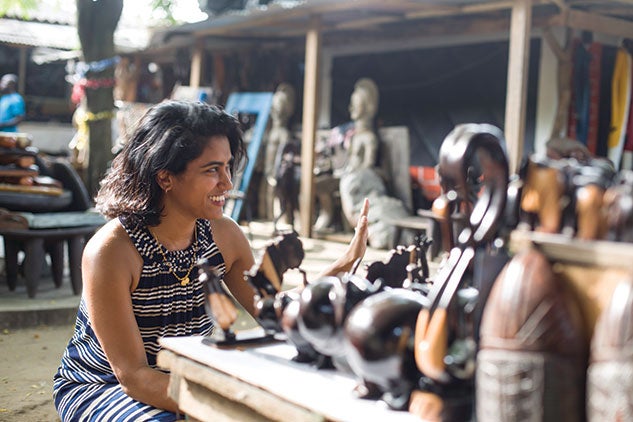Writing Home: Salutations Depuis Abidjan!
Greetings from Abidjan

I wake up in Abidjan, Côte d’Ivoire, to a blast of heat and humidity, the sound of car horns, endless construction and the smell of grilled fish. My 15-minute commute to work starts with grabbing some food from a street vendor. Since I am not an early riser, breakfast usually involves the last bits of what she has — beans, part of an omelet, leftover stew, potatoes and the signature Ivorian pepper paste. I then pick through the sandy, potholed streets, passing an assortment of shops and stands: upscale bakeries, car wash stations, Western Union branches as well as vendors selling garba — fried tuna served with diced tomatoes, onions, hot peppers and the ubiquitous cassava side dish, attiéké.
Abidjan is a lively city, and I find that the best way to experience it is on foot. Despite my lifelong challenge with navigation, I rarely get lost when walking. I ask for directions and in return make acquaintance-friends who alternate between providing helpful information and sharing blunt, unsolicited advice: “You look tired today. You should wear more lipstick,” for example.
What always feels comforting to me is the sense of community — a community that includes me, even as a white woman (though I am Indian-American, in sub-Saharan Africa, I am considered white). I’ve had positive experiences throughout West Africa, but Abidjan’s unique habit of using French rather than local languages and its historically open postcolonial immigration policy have made it a particularly easy transition for me and other nonnatives.
I am living here through the luck of the draw. My company needed a regional coordinator for a USAID-funded health policy project. By day, I support a team of amazing professionals working with government ministries in six West and Central African countries to build policy platforms to prevent the spread of zoonotic diseases like Ebola. Outside the office, I commit to discovering new neighborhoods and enjoying Abidjan’s local music and food scenes.
As an anthropology major at Rice, I felt that it was the norm rather than the exception to be drawn to living abroad and adapting to different cultural environments. I am not sure what comes next for me after my current role here ends, but I know this very uncertainty is a natural part of the learning process. The lessons Abidjan has taught me will make me better prepared than ever for the next challenge.
— Chethana Biliyar ’08
